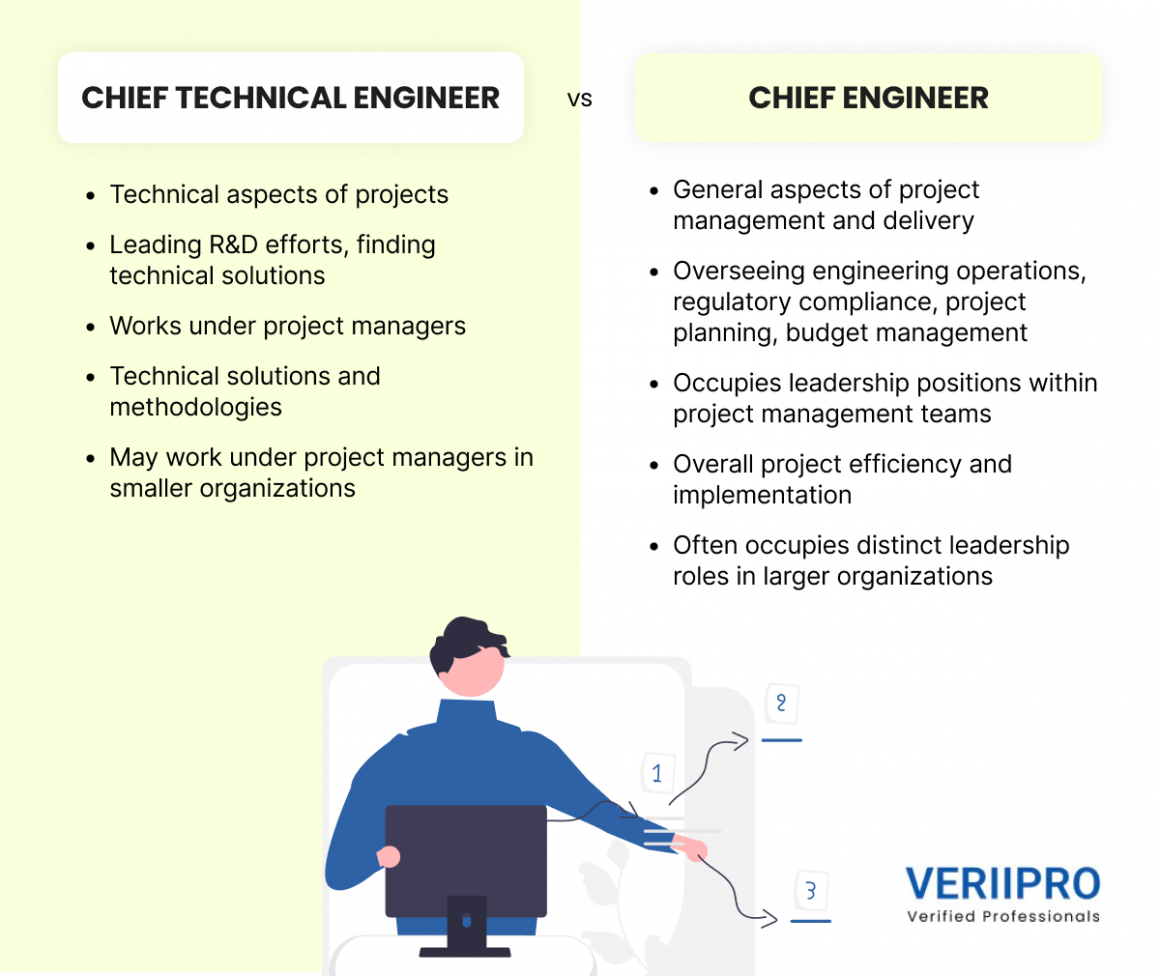Becoming a Chief Engineer: A Comprehensive Career Guide
As engineering solutions become a key part of industrial development, organizations are investing heavily in building reliable teams to manage their technical projects. As a result, there is a rising demand for skilled engineers who can provide novel solutions to industry-specific problems. The job role of a chief engineer is to provide technical and managerial leadership for executing industrial projects.
The duties of a chief engineer can differ greatly based on the domain of work, geographic location, and company structure. However, if you are someone who is planning to build their career as a chief engineer, you need to learn about chief engineer duties and responsibilities before finalizing your decision.
This article provides a detailed overview of the key duties, qualifications, and future career outlook of a chief engineer position.
What Does a Chief Engineer Do? Duties and Responsibilities
A chief engineer is responsible for leading an engineering department towards the completion of various projects. They take charge of managing the day-to-day functions of an engineering team. Here are some key responsibilities of a chief engineer:
LEADERSHIP
A chief engineer is often required to lead a team of engineers and other technicians. They take on the duty of successfully executing team projects by providing guidance, direction, and mentorship to its members.
Many chief engineers are involved in the simultaneous management of multiple projects. Their job is concerned with planning, scheduling, and coordinating resources to ensure timely completion of projects.
TECHNICAL GUIDANCE
Chief engineers are usually assigned projects that require technical guidance from industry experts. As chief technical engineers have years of experience in their fields, they are expected to provide technical support to junior engineers and other team members. They also play a key role in solving complex problems that might arise during project execution.
QUALITY ASSURANCE AND REGULATORY COMPLIANCE
Chief engineers are tasked with implementing quality control processes to monitor project performance and progress. They ensure that engineering projects meet quality standards in their implementation and are completed using ethical processes. Chief engineers are also involved in ascertaining that their project complies with relevant laws, regulations, and industry standards.
COMMUNICATION AND COLLABORATION
Chief engineers are responsible for establishing coordination among their team members, while also fostering collaborative relationships with other departments in an organization. They often work closely with specialized teams for research, production, marketing or analytics to ensure that their projects are in line with the larger objectives of a business. As a consequence, chief engineers need to be skilled communicators who can effectively present their projects to clients, upper management, and other stakeholders.
Essential Qualifications for a Chief Engineer Position
The qualifications required for a chief engineer role can vary according to the industry, position specifications, and the organization they work for. However, some common qualifications that employers look for when hiring chief engineers are as follows:
EDUCATION
The minimum educational qualification needed to apply for a chief engineer’s position is a bachelor’s degree in the relevant engineering domain. As this is a senior role that requires leadership acumen, most employers may favor candidates with a master’s degree or another higher qualification. Additional certifications and training courses in specialized fields are sometimes required for industry or project-specific roles.
EXPERIENCE
Most employers seek candidates with at least 4 years of experience in supervising a project, and several more years of experience working as an engineer in the relevant domain. A chief engineer needs to have a sound understanding of engineering principles, and the ability to successfully manage an engineering team. Just possessing knowledge about the technical aspects of engineering is not enough for a chief engineer, as they also need excellent interpersonal skills to be able to guide their teams toward project completion.
PROJECT MANAGEMENT SKILLS
Chief engineers need to have the ability to plan and organize the execution of large-scale engineering projects. To be effective at their jobs, they have to be skilled at solving complex technical problems while adhering to budget and time constraints. To manage the implementation of complex projects, chief engineers also need industry-specific knowledge of regulatory standards and laws covering engineering safety practices.
Navigating Your Career Path to Chief Engineer
Navigating a career path to become a chief engineer requires a commitment to continuous learning and development. Any engineer passionate about taking up leadership roles within their field can become a chief engineer within their organization.
Here are some general steps you can take to forge your career as a Chief Engineer
- After completing your initial education in engineering, find job roles that can offer you practical training and industry experience. Early on in your training, you must focus on building a strong understanding of basic technical skills that are most relevant for real-world projects. Try to gain exposure to wider areas of engineering knowledge and expand your profile by taking up additional courses or certifications.
- Volunteer to take on increasing levels of responsibility and leadership positions within your company. This phase may involve leading smaller projects, mentoring juniors, supervising specific tasks, or assisting seniors in developing project implementation plans.
- Continuous professional development is key to maintaining your position as an expert within your field. The market rewards growth, and a skilled professional must invest in enhancing their technical expertise. This means that you should consider pursuing advanced degrees, and niche-specific training courses to keep refining your qualifications.
- Be proactive in seeking out new opportunities for career advancement within your current organization or through openings in different companies. Building a profile that reflects a diverse set of industry experiences helps potential employers see you as a passionate learner who can take on challenges. Showcasing your abilities to grow and adapt to a rapidly evolving technical landscape reflects your talents as a true professional.
- Participate in networking events and stay active on professional networking sites such as LinkedIn and VeriiPro. This allows you to position yourself as a verified professional within your field, while also building relationships with other experts and industry leaders. Efficient networking skills can help you obtain key insights on industry trends to guide your future career trajectory.
Chief Technical Engineer vs. Chief Engineer

Understanding the Difference
The titles “Chief Technical Engineer” and “Chief Engineer” can be used to represent different job profiles within the engineering industry. In broad terms, a chief technical engineer is usually focused on the technical aspects of an organizational project. On the other hand, the chief engineer’s position can be concerned with general aspects of project management and delivery.
A chief technical engineer provides technical guidance to a company’s projects. This means that they are responsible for leading R&D efforts and finding viable solutions to meet the technological needs of a project. They also implement innovative technologies and create methodologies to improve engineering processes. The technical chief engineer works under the broader direction of project managers to ensure the smooth functioning of machines and applications involved in the execution of a project.
In comparison, the chief engineer job description focuses on handling managerial responsibilities to guide a project toward completion. The duties of a chief engineer may include overseeing engineering operations, monitoring regulatory compliance, planning, and scheduling project phases, budgetary management, and establishing coordination among members. A chief engineer occupies a multi-dimensional role in supervising projects from conception to completion. They often occupy leadership positions within project management teams and are involved in various levels of decision-making to improve the efficiency of project implementation.
There is often an overlap between the responsibilities of chief technical engineers and chief engineers. Consequently, smaller organizations often combine these two roles into a single position to build leaner teams. In larger organizations, these two roles may occupy a distinct position within teams and get assigned a specific set of responsibilities.
| ASPECT | CHIEF TECHNICAL OFFICER | CHIEF ENGINEER |
| Focus | Technical aspects of projects | General aspects of project management and delivery |
| Responsibilities | Leading R&D efforts, finding technical solutions | Overseeing engineering operations, regulatory compliance, project planning, budget management |
| Leadership | Works under project managers | Occupies leadership positions within project management teams |
| Decision-making | Technical solutions and methodologies | Overall project efficiency and implementation |
| Position in organization | May work under project managers in smaller organizations | Often occupies distinct leadership roles in larger organizations |
Find High-paying Chief Engineer Jobs with VeriiPro
Chief engineers are in high demand across industries such as manufacturing, IT, construction, and numerous other sectors that rely on engineering solutions. As industries try to induce continuous innovation to improve their products, the job of a chief engineer is only going to grow in relevance over time. Although there is no shortage of chief engineer jobs in the market, it is still challenging for aspiring engineers to find positions that match their qualifications with the right employers.
To solve this problem, VeriiPro offers a verified platform that helps skilled professionals find jobs that can set their careers on the right track. VeriiPro lets potential candidates access exclusive job listings and interactions with a respected network of experts who can guide them in their journeys toward becoming chief engineers.
If you are a chief engineer who wants to access the best jobs in your industry, join VeriiPro today!
Frequently Asked Questions –
What does a Chief Engineer do?
A Chief Engineer is responsible for leading the engineering department within an organization, overseeing the development and implementation of technical strategies, managing engineering projects, and ensuring that engineering solutions meet company standards and objectives.
What are the essential qualifications needed to become a Chief Engineer?
Essential qualifications include a bachelor’s degree in engineering or a related field, significant experience in engineering roles with progressive responsibility, leadership skills, and in some cases, specific certifications relevant to the industry.
How can I navigate my career path to become a Chief Engineer?
Start with gaining a solid educational foundation in engineering, followed by accumulating hands-on experience in various engineering roles. Seek opportunities for leadership and project management, and continuously update your skills and knowledge in the field.
What is the difference between a Chief Technical Engineer and a Chief Engineer?
While both roles involve leadership within the engineering department, a Chief Technical Engineer typically focuses more on the technical aspects and innovation in engineering solutions, whereas a Chief Engineer may have broader responsibilities including administrative and managerial duties.
How long does it typically take to become a Chief Engineer?
The timeline can vary based on individual career paths, but it generally requires several years of experience in engineering roles, with at least some of those years in leadership or senior positions.
Are there specific industries or sectors where Chief Engineer roles are more common?
Chief Engineer roles are common in various industries, including manufacturing, construction, technology, and any sector that relies heavily on engineering solutions and innovation.
What is the job outlook for Chief Engineers?
The job outlook for Chief Engineers is positive, with continuous demand for skilled leaders in engineering across various industries. The specific outlook can vary by sector and geographic location.
How does VeriiPro help aspiring Chief Engineers in their career path?
VeriiPro provides access to exclusive job listings, including Chief Engineer positions, and offers resources and support to help candidates enhance their qualifications and connect with potential employers in the tech industry.
Does VeriiPro have exclusive job listings for Chief Engineer positions?
Yes, VeriiPro offers exclusive job listings for Chief Engineer positions that candidates might not find elsewhere, along with personalized support in the job search process.








